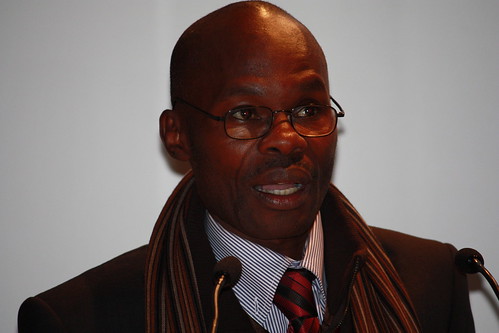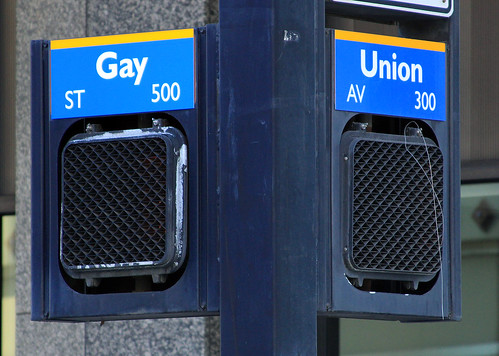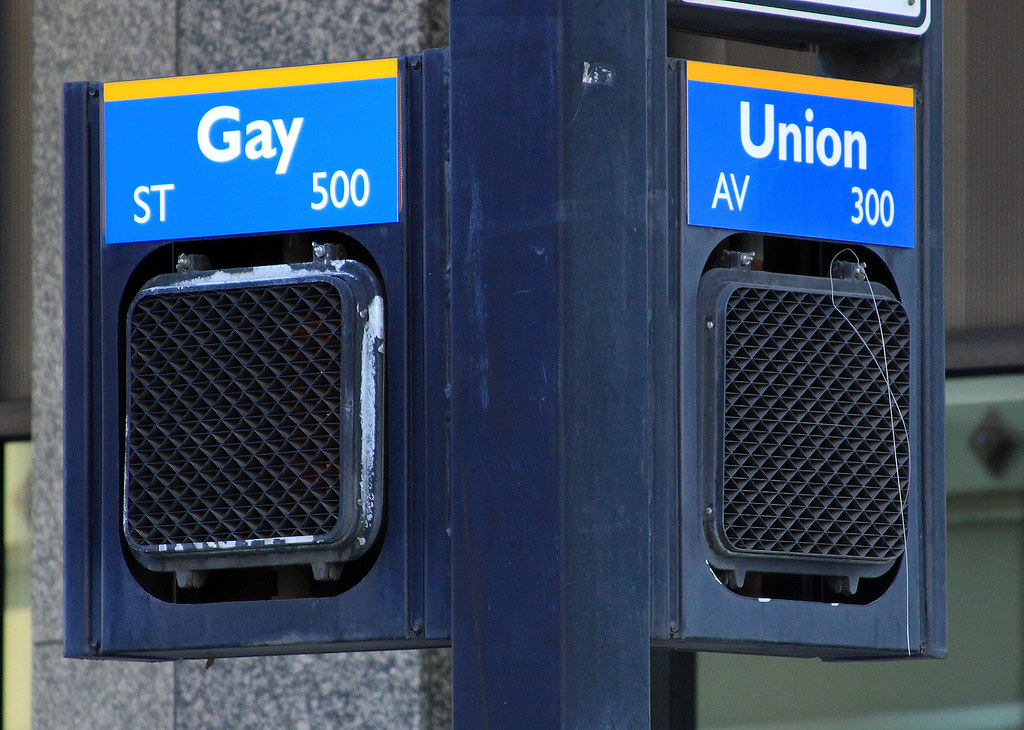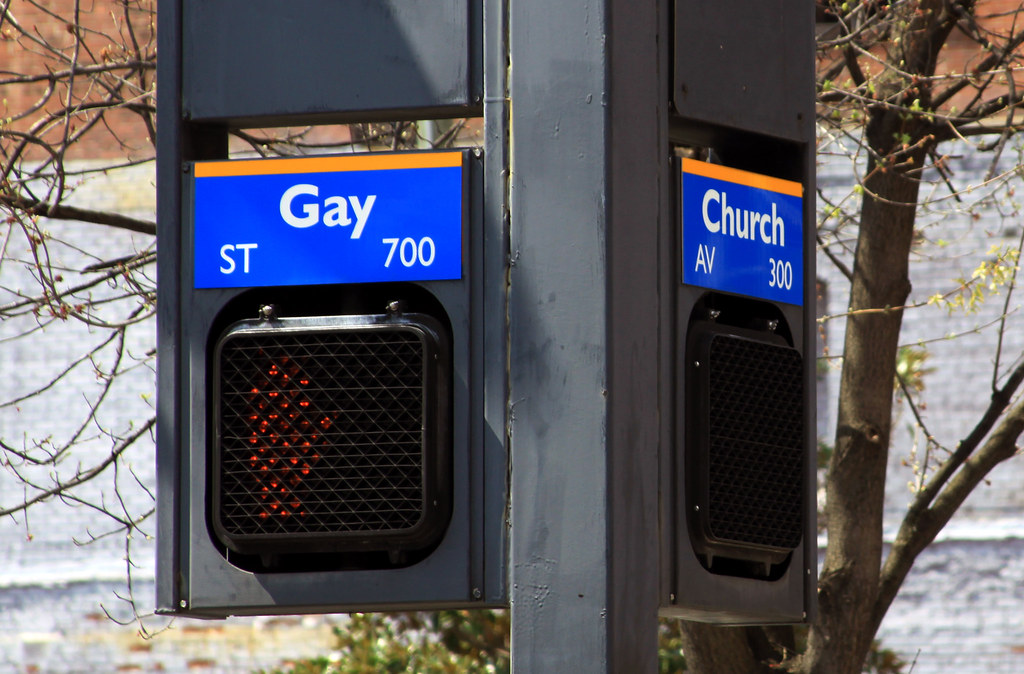 |
This is Bart Ehrman. I found him to be a
human being, contrary to popular opinion. |
So, there is an event that has been weighing heavily on my mind recently, and it's keeping me from studying on my exam. A week ago Thursday I was in our university auditorium setting up my camera to take pictures for a Bart Ehrman talk. (Sometimes I think I must be the most tolerant evangelical in the world. The pictures were a personal favor for a professor.) I roped my minister friend into helping me set up beforehand, and we chatted quietly as he helped me get the tripod leveled:
"Did you hear about Uganda?" He asked me.
"No," I answered with a grunt. "What's up?"
"Some gay rights activist was killed today, and people are blaming Christian missionaries for it..."
"Who was it? What was his name?" I asked, and my minister friend just shrugged; he couldn't remember. I leaned over onto the empty tripod to kill the nausea rising in my stomach. I was pretty sure I knew who the victim was before I checked the news reports later that night-- it had to be David Kato. I grimaced in rage.
"...Maybe I shouldn't have told you," my friend answered, and I shrugged it off for the moment. We had to finish setting up.
I watched Ehrman laugh through my camera lens while I checked the lighting and he shared some gossip with the facilitators. His lightheartedness against my anger made me feel like were on two different planets. I had to mentally check out of much of the lecture to sort through what my minister friend had told me, which made me feel bad. Ehrman was an earnest, likeable fellow in his own way, and he treated me very well; I just had other things to think about.
If you've never heard of him, David Kato Kisule was a remarkable and troubled human being. A Uganda native, he had worked hard on a local, national, and international level to improve the lot of an LGBT population routinely denied even basic rights in a nation where well over 90% of the population strongly disapprove of homosexuality. He proved to be a vocal and stubborn representative for Ugandan gays, and that openness left him constantly threatened, battered, and harassed. And, in spite of the psychological toll, he continued.
The political wildfire started a little while ago when a few fundamentalist groups whom I rather dislike held a conference in Kampala about the so-called "homosexual agenda" and protecting the society. After meetings with two of the conference organizers, particularly Scott Lively [
oh, barf it's the
Pink Swastika guy], the legislature proposed a bill to marginalize the gay population even more: prison time for gay marriage, restrictions on housing, and allowing the death penalty to those gays labeled especially "pernicious." The international community cried foul; activists helped fuel the outrcy against it, and the bill was tabled.
 |
| David Kato, from Uganda. He was also a human being, contrary to popular opinion. |
About four months ago, Kato's picture showed up on a local paper's front page as part of a huge campaign to "out" people. His picture, name, and personal information were all included-- with a hundred other people's-- under a banner that read "hang them." Kato and two others filed suit against the paper's editor for invasion of privacy and won. He only had time to celebrate their legal victory for about three weeks before his friends found him dead. He was beaten with a hammer. I love
that newspaper editor's response to Kato's death: "When we called for hanging of gay people," he protested, "we meant ... after they have gone through the legal process... I did not call for them to be killed in cold blood like he was." Well, gee, mister, I guess that makes things all better, doesn't it?
So, yes, I was disheartened to hear of Kato's death. But there is something about this story that resonates deep in my bones. It's not necessarily the brutality or the links to Christian terrorism that bother me (although I want to give Lively and a few radical ministers a kick in the head).
What bothers me is that David Kato Kisule died in a land of red earth. The words I hear coming from that land of red earth are echoing the voices in my head from when I was nineteen. I know what those words led to in my own red-soiled land, and I don't like it. I hear the echo and want to argue back.
I mean, listen to the narrative here: An out gay male from a culture suspicious of gays is found bludgeoned with a blunt object. The police focus on two suspects. At the murdered man's funeral, a preacher goes on a homophobic rant, and the mourners try to block him from the proceedings. One of the two suspects, when arrested, pulls out a "gay panic" defense. A certain part of the religious community uses his death to rant about the "gay agenda," and the LGBT community organizes in response. The international community intervenes, but a lot of people treat the problem like it's "way out there" and not their problem. And in the end, the larger straight community is unsure what to do, personally and legislatively, in response. Many of them then call the killing a robbery gone bad.
With a change of location, this narrative could just as easily be about Matt Shepard, and I personally am concerned with how much that past tragedy is scripting others now. I mean, let's compare notes:
(WARNING: Lively is beyond offensive. Read at your own risk!)
Giles Muhame, editor of the paper sued for outing gays:
"When we called for hanging of gay people, we meant ... after they have gone through the legal process," said Giles Muhame. "I did not call for them to be killed in cold blood like he was." (source: CNN)
Scott Lively:
"It has since been reported by the New York Times that the local police do not believe this was a hate crime but a robbery. This has not deterred the Times, and the rest of the "mainstream" media from using this crime to advance the "gay" narrative that all disapproval of homosexuality leads invariably to violence and murder of homosexuals. This is propaganda, not journalism and it is a false premise." (source: bleh.)
Okay, now compare it to these regarding the Shepard incident...
Fred Phelps:
"You don't kill anybody. Not just you don't kill a fag, you don't kill anybody, because our laws prohibit it. But that's not what's going on here. this has become a cause célèbre for the "gay agenda..." (source: NPR)
Scott Lively (again):
"Matthew Shepard was just another self-identified “gay,” but on October 12, 1998, he was murdered by two men. He wasn’t killed because he was a homosexual, it was a matter of robbery. And the robbers obviously weren’t Christians. However, the timing was right for the “gay” scheme, and so Matthew Shepard became the new martyr of the homosexual movement: a symbol of “gay” victim hood at the hands of the evil Christians." (source: *gag*)

It's kind of fascinating to watch David's story follow such a similar form as Matt's, and especially the way that the story's being framed. It also makes me a little nauseous because it makes me wonder how much that previous narrative might help push international discourse in the same direction. How much has Matt Shepard's story set the terms of discourse for incidents like these? And, is there anything we can do about it?
There is one narrative in particular that I noticed, too, but I'll let the blogger
Gay Uganda explain. He has been trying to sift through the news to understand what is going on in the Kato case:
Have just heard it on Capital FM. Apparently, the guy who was staying in David's place, the guy who was working for him has been arrested. At Mukono Police station at the moment.
And, from what I heard, he has confessed to the murder, reporting that Kato forced him into having sex, so he killed him.
True, false, I don't know?...
...yeah, in Uganda, putting the blame on the big bad homosexual works all the time. [Homosexuals] are evil, they are bad, they are terrible. They deserve hanging.
So, I killed him because he attacked me, or he made advances. Homosexual advances. So, I hit him twice with a hammer...
Gay Panic Defense? I believe that is what it is called. And, in Uganda, we [gays] are so vilified, it can work. Terrible as it seems. That is a fact.
Gay Uganda (who also lives in Kampala) is recognizing a pattern within the Kato murder investigation, and "gay panic" is the phrase he settles on to define the way that authorities or perpetrators shift blame to the gay victim and justify their victimization. When Matt died, his murderer called it "gay panic." The name, at least, stuck. But does the influence go no further? I hope not. I hope McKinney didn't serve as a role model for such dreck.
Then there's the robbery narrative, which both the Kampala police and Scott Lively put forward. Lively has long been involved in the Laramie story because he has long harassed and mocked the LGBT movement. Not long after Matt's murderers were tried, Lively stuck his nose into the debate and had the temerity (or the insanity) to compare Matt's rise in the media world to how the Nazis adopted Horst Wessel as an icon. (Oooh,
Nazis. Way to jump the shark there, Scotty.) At the same time, he also blamed Matt's murder on a simple robbery. Not surprisingly, that's the
exact same excuse he used to distance himself from his direct complicity in the Kato murder. He
went to Kampala to fuel this kind of homophobic outrage; whether Kato was a direct victim or collateral damage of his hate campaign is simply a matter of degree regarding his guilt. It's like he's turned this into his M.O. anytime somebody says he's complicit for the results of the violence-laden homophobia he preaches.
And, so: where are we now? It's an interesting puzzle, but it's one that I'm a little too partial to consider correctly. Of course I see shadows of Matt everywhere; his absence is burned into my memory like a cut-up photograph. And yet, the story we all tell about his murder has obviously shaped the discourse on gay rights, homophobia, and violence. What has that narrative contributed to this new story of a Ugandan activist beaten to death just three weeks after he won a suit in court? Perhaps the Shepard murder's legacy is inscribed in our language, with terms "gay panic" or "gay agenda." Maybe that narrative has lent us narrative schemas that the culture at large now uses to make sense of similar issues. Or, maybe Scott Lively has simply found a cheap, dirty way to eschew any responsibility for the human casualties of his hatred and ignorance.
On the whole, the David Kato story isn't like Matt's much at all. Kato died in a city of over a million people, in his own home. He was possibly murdered by a man living under his own roof. At the moment, nobody is really sure what happened or whether to trust the main suspect's confession. Kato lived in a society with much more than a homophobic subtext; it's the majority opinion. And, as much as I try to downplay the religious role in my own community, the direct involvement of Christian fundamentialism in Uganda is clearly making people suffer. It's all really a matter of where you focus, and how you read the signs.
So: did Matt change the way we talk about hate crimes and homophobia? Is it for good or for ill? Or, am I just seeing part of a much older narrative of violence and denial? Has the Laramie murder unwittingly developed a strategy for nay-sayers to ignore LGBT suffering?
I don't know. I just don't know where to go with this. Any suggestions out there???
NOTES:
If you're interested in following David Kato's story, there are some great sites out there from African sources you can follow:
Gay Uganda: a gay blogger from Kampala who was familiar with Kato:
http://gayuganda.blogspot.com
Behind the Mask: an African organization providing LGBT news, resources, and activism:
http://www.mask.org.za
Gay Rights Uganda: Just what it sounds like:
http://www.gayrightsuganda.org/
PHOTO CREDIT:
1) Bart Ehrman, by me.
2) David Kato Kisule, from Abolire la miseria della Calabria, via
Flickr.
3) A NYC protester of the Uganda anti-homosexuality law, from the International Women's Health Coalition, via
Flickr.
 In case you hadn't heard, the head of the nation's largest "ex-gay" ministry, Exodus International, announced that they would be closing its doors and offered an apology to the LGBT community for the damage they caused. You can watch the video below if you haven't seen it.
In case you hadn't heard, the head of the nation's largest "ex-gay" ministry, Exodus International, announced that they would be closing its doors and offered an apology to the LGBT community for the damage they caused. You can watch the video below if you haven't seen it. 












